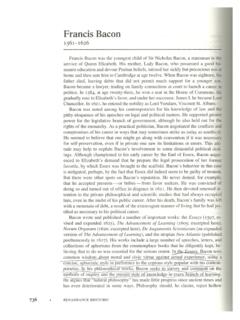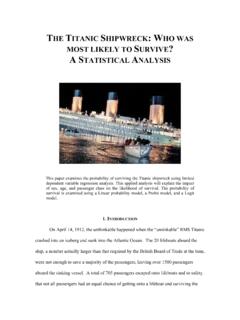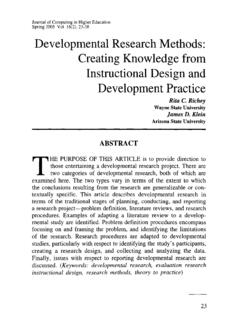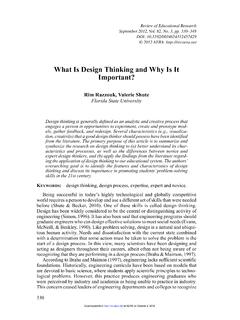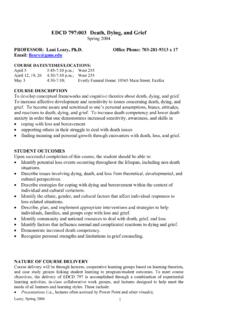Transcription of Sociology of Death and Dying - myweb.fsu.edu
1 Sociology of Death and Dying SYA 4930 Instructor: Miles Taylor, PhD Fall 2016 Email: Online Course Office: 232 Pepper Bldg. Couse Website: Course Description: Sociology of Death and Dying is the study of the structure of the human response to Death , Dying , and bereavement in their socio-cultural, interpersonal, and individual context. Cultural and medical factors shaping a good Death , formation of Death perceptions and grief over the life course, functions of the funeral, Death -related ethical debates; and traumatic deaths are the topics to be discussed. Course Objectives: By the end of the course, students should be able to: (1) Describe changing demographics, attitudes, and practices surrounding Death .
2 (2) Recognize how individuals and groups deal with the social-psychological aspects of Death , Dying , and bereavement and how Death , Dying , and bereavement differs for persons at various ages of life. (3) Compare societies and groups within societies on how they deal with Dying , Death , and bereavement. This will include cultural and religious contexts, media influence, and childhood socialization. (4) Summarize how various institutions and professionals manage Dying , Death , and bereavement. Included will be the social functions of funerals and religious rituals surrounding Death . (5) Explain current trends, attitudes, and dynamics regarding end-of-life issues such as suicide, grief, widowhood, and the social organization of Death and Dying in modern society.
3 Required Texts: Students are responsible for all assigned readings. At the end of this syllabus is a class schedule that details all readings, major assignments, and important dates. All students are required to purchase/rent the following textbook: *NOTE* Both Pearson and Routledge are publishers of this book (see 2 images of cover), depending on the version (digital/print) and its year of print (pre-post 2015). Searching the ISBN number online will give you access to new and used print versions, along with digital, from a number of retailers. As long as the copyright reads 2013-2015 you should have the correct book. Additional Reading(s): Additional/supplemental readings and video content for the course will be posted on Blackboard (BB) and will be available to you from the time you begin each module through the end of the semester.
4 These are REQUIRED and are meant to be used in conjunction with the textbook. You will be evaluated on this material in quizzes, and they will also be particularly useful in enhancing your papers and assignments. You must be able to read pdf documents on your computer, view streaming audio and video, as well as basic word processing and spreadsheet documents in accessing the required content for this course. It is assumed that by registering for an online course, you will acquire sufficient Internet access for yourself in such a way that your completion of course assignments will not be impeded. In the event that you find yourself having problems with Internet access, it is up to you to sort it out and complete your assignments on time.
5 Obviously, college libraries are good places to access Internet, but keep in mind that there is free WIFI in many places on FSU s campus as well (all you need is your FSU ID to log on). I also encourage internet use at public libraries, in addition to establishments such as Panera Bread, Starbucks, Crispers, and many other local coffee shops. CLASS FORMAT: Although this class will not meet face-to-face there are several ways that you can connect with the instructor, mentors, and each other over the semester. First, we will have interaction via the discussion board. Within the first few days of class, we will post online biosketches in order to get to know one another. This discussion board will then be available to ask general questions that will remain open throughout the semester.
6 There you may find answers to some of your questions, removing the necessity for you to wait for a response from your mentor or me. The instructor and mentors will also be available to you via email. If you send an email to either your mentor or me, know that you can expect an answer in about 24 hours during the week. If you email us during the weekend, it is best to assume that we will not respond until Sunday night or Monday morning. Remember that you will have narrated INTRO PowerPoints for each learning module to remind you of the contents, materials, and assessments of that module along with important due dates. Watching/listening to these short lectures is especially important for your success in this course. Kemp, Alan R.
7 2014. Death , Dying , and Bereavement in a Changing World. ISBN-13: 978-0205790760 / ISBN-10: 0205790763 *Please Note: Florida State University operates on Eastern Standard Time (EST), so this course will too. Therefore, all due dates and time windows will refer to EST. Also keep this time zone in mind when sending emails to the instructor and online mentor. COURSE REQUIREMENTS & GRADING: Online bio: (30 points): Students should create a short bio to post on Blackboard on the Course (not group) discussion board. This bio will count as your first-day attendance. Students not completing this assignment will be dropped from the class. Email to online mentor (20 points): Students will receive an email from their online mentor establishing contact and introducing themselves.
8 The subject line of the email will include the course name and number. Students need to send a reply email to their mentor within 48 hours of this email acknowledging receipt of the email. Self-Inventory Assignment: (100 points) Students will complete a Death and Dying Self-Inventory during the first week of class on their own attitudes and experiences surrounding Death prior to enrolling in the course. Note, Part 1 is available in the first Learning Module (Week 1) and is due the second week of class. Part 1 is worth 20 of the 100 points. The student will later be paired with another student in the class. Partners will not be assigned until the third week of class as an attempt to alleviate any issues with students dropping the class.
9 Students will share their Self-Inventories with their partners, via Blackboard, and briefly discuss similarities and differences in their inventories. Finally, each student will write a 2-3 page reflection on their own and their partner s Self-Inventory, applying concepts and information learned throughout the class. The papers are not collaborative, they are written independently after correspondence with partners. This paper will be turned in under Turnitin, not posted on the discussion board, etc. and thus not visible to any other students. Field Research Assignment: (250 points) Students will take a self-guided field trip to a local cemetery or 2 to analyze gravestones/markers. There will be two specific options for students on the topic of analysis but both topics will require the same amount of field time/analysis/research.
10 Students will then write a 5 page report synthesizing their findings and relating these experiences to concepts from the course readings or other scholarly literature. This assignment should be submitted through Turnitin. Quizzes: (200 points) A quiz will be given for 13 of the learning modules (with the holiday off) and will cover material from the Powerpoint slides/lectures, textbook chapter/s, additional readings and any additional course materials (including videos, etc.) indicated on the course calendar. These quizzes will be available during the entire week of the Module we are covering, closing Friday at 11:59PM EST unless otherwise noted. They are open book/open note but you CANNOT work together. NOTE you will have 30 minutes to take each quiz and only 1 attempt.
